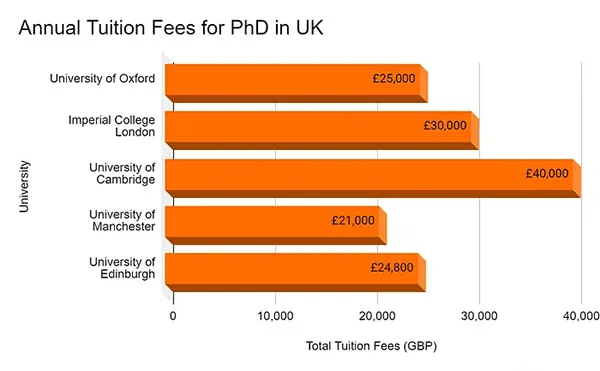
Studying in the United Kingdom is an enriching and fulfilling experience. However, it doesn’t come cheap. Pursuing higher education in the UK comes with a hefty price tag. The UK neighborhoods are costly, and the tuition fees go through the roof.
The average cost of study in the UK is estimated at around £22,200 annually. However, the cost of studying can vary from one institution to another. It depends on various factors, for instance, your lifestyle can change the expense significantly.
In this blog, we will explore the different costs associated with studying in the UK. We will offer you an estimate and guide prospective students to plan their finances to study in UK . Read along –

Tuition Fees
Tuition fees are a major expense for students living in the UK. However, this cost may vary significantly depending on certain factors. The university or the course you choose plays a major role in the final expenses.
According to the latest data, the average annual tuition fee for undergraduate students is £11,400 to £38,000.

Postgraduate programs are significantly costlier. Students pursuing business, medicine, and engineering spend more on tuition fees than others.
On average, the annual tuition fees for postgraduate students vary from £9,000 to £30,000. To know more details about the same, get IELTS coaching online from AbroAdvice.com.
University Choice
The choice of university is a significant cost factor. Prestigious universities like the University of Oxford or Cambridge have higher tuition fees. On the other hand, public universities are usually less expensive than private institutions.
For example, the universities in England, Scotland, and Northern Ireland tend to be cheaper. They charge approximately £9,250 annually for undergraduate tuition. For accelerated degrees, the costs are much higher.
Average English universities charge up to £11,100 for these degree courses. However, the universities in Wales charge a smaller amount. Usually, their fees don’t exceed £9,000 a year.
Most students can’t pay such high fees. Hence, they apply for an education loan. They have the option to apply to Student Finance England or just contact AbroAdvice. The expert consultants can help you connect with the best places to get financial aid.
Sometimes, the financial aid may not cover the entire tuition fee. In such cases, you need to pay the difference yourself.
Location

The cost of living in the UK varies greatly by location. Major cities like London are more expensive. Students usually spend £12,000 to £15,600 annually to live in London. Most of the other major cities are also quite pricey.
However, the cost of living in the smaller towns is significantly less. You can stay in Leicester, Newcastle, or Belfast for much less. The average cost of staying in such places can be between £10,800 to £15,000 per year.
Usually, your choice of university influences your choice of location. Many students prefer to stay near their campus. Thus, they try to save their transportation cost and time.
However, if you choose to stay near a premium university like Oxford or Harvard, the accommodation cost can be extremely high. Similarly, if your chosen institute is Coventry University or the University of Bedfordshire, you can find quite cheap places to stay nearby.
Accommodation
The cost of accommodation is another substantial part of your budget. You can choose between university-managed accommodation, private rentals, or homestays. On-campus housing can be more convenient but might be pricier, renting a private apartment might be cheaper but require more effort in terms of locating a suitable place.
Living Expenses
Living expenses include
- Food
- Transportation
- Entertainment
- Other day-to-day costs.
On average, students spend £800 to £1,000 per month on these expenses. However, this can vary widely depending on your lifestyle.
Visa Fees

International students require a student visa to study in the UK. As of my last knowledge update, the Tier 4 (General) student visa application fee was around £348. However, these things often change over time. So, it is vital to check the latest visa requirements and fees.
Healthcare
Students residing outside the European Economic Area and Switzerland need to pay more for healthcare. Most international students are needed to pay an Immigration Health Surcharge when applying for a visa.
The IHS covers access to the National Health Service (NHS) and can vary depending on the duration of your visa.
Books and Supplies
You will also need to budget for academic materials. This includes textbooks and supplies. Some of the books can be quite costly, too. So, make a separate budget each month to cover these expenses. Costs for these items vary depending on your course of study.
Travel
You also need a separate fund to cover the traveling expenses. Many students plan to visit their home country during holidays. Some go from small vacations to extended weekends. For all these, you should budget in advance.
The below statistics show the annual tuition fees for PhD in the UK.

Student Union and Society Memberships
Joining student unions or clubs is an integral part of university life. These memberships aren’t exorbitant, but they can add to your overall expenses.
Miscellaneous Costs
Be prepared for unexpected expenses. This could include replacing a lost smartphone or covering the expense of special field trips or projects required for your course.
Currency Exchange Rates
International students need to consider currency exchange rates when planning their budget, as it can impact the cost of living and transferring funds from their home country.
Here’s a Fun Fact-
Brits drink a lot of tea… about 100 million cups every day!
Scholarships and Financial Aid
One way to cover the cost of living in the UK as an international student is through scholarships. There are numerous options available in the United Kingdom, research well and opt for the best option that suits you.
Conclusion
Many universities offer scholarships and financial aid to international students. It’s necessary to research and look for any opportunities to offset your fees. The cost of studying in the UK is approximately £9,000 to £38,000 per year.
Other expenses include accommodation, living costs, visa fees, and others. So, it is necessary to create a detailed budget with enough time in hand. That way, you will get enough scope to explore potential sources of financial assistance.
If you are having trouble discovering scholarships, take the help of experts. They can help in finding many part-time work opportunities or student grants.
Moreover, you should also check with your university for the most up-to-date information. Check the brochures or websites for the latest costs and financial support options. Through careful financial planning, students can ensure an enjoyable academic experience in the UK.
Also Read: Complete Guide on Notebook Sizes